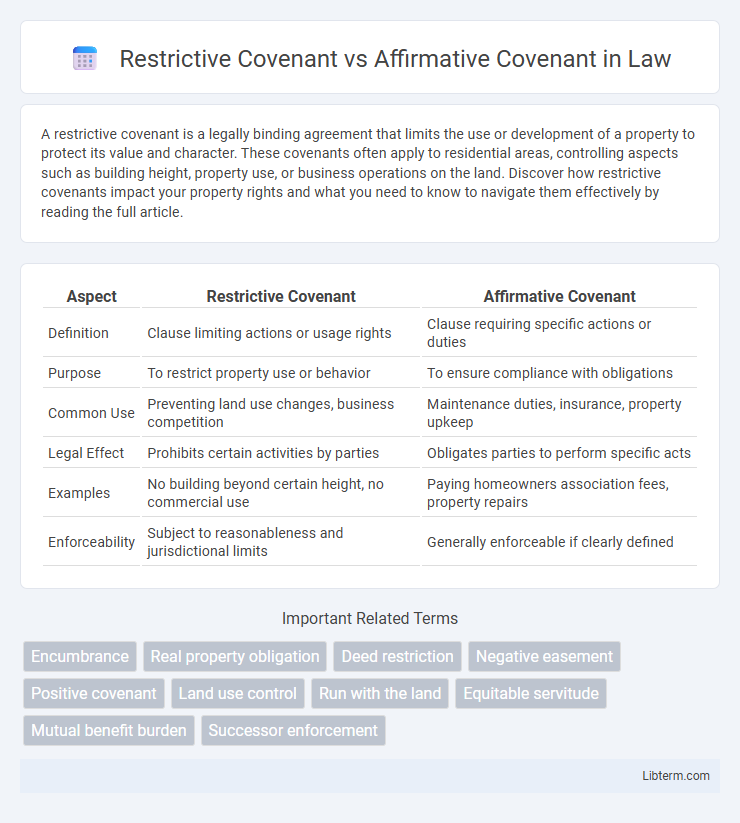A restrictive covenant is a legally binding agreement that limits the use or development of a property to protect its value and character. These covenants often apply to residential areas, controlling aspects such as building height, property use, or business operations on the land. Discover how restrictive covenants impact your property rights and what you need to know to navigate them effectively by reading the full article.
Table of Comparison
| Aspect | Restrictive Covenant | Affirmative Covenant |
|---|---|---|
| Definition | Clause limiting actions or usage rights | Clause requiring specific actions or duties |
| Purpose | To restrict property use or behavior | To ensure compliance with obligations |
| Common Use | Preventing land use changes, business competition | Maintenance duties, insurance, property upkeep |
| Legal Effect | Prohibits certain activities by parties | Obligates parties to perform specific acts |
| Examples | No building beyond certain height, no commercial use | Paying homeowners association fees, property repairs |
| Enforceability | Subject to reasonableness and jurisdictional limits | Generally enforceable if clearly defined |
Understanding Covenants: Definitions and Key Differences
Restrictive covenants limit or prohibit certain actions by the borrower, such as restrictions on asset sales or incurring additional debt, to protect the lender's interests. Affirmative covenants require specific actions from the borrower, like maintaining insurance or providing financial statements regularly, ensuring ongoing operational standards. Understanding these covenants is crucial for analyzing loan agreements and managing credit risk effectively.
What Is a Restrictive Covenant?
A restrictive covenant is a legal clause in a contract that limits or prohibits specific actions by one party, often used in real estate or employment agreements to prevent activities such as property alterations or competitive business operations. It serves to protect the interests of the other party by restricting behaviors that could cause harm or reduce value. Unlike an affirmative covenant, which requires a party to take certain actions, a restrictive covenant strictly prohibits certain activities.
What Is an Affirmative Covenant?
An affirmative covenant is a legally binding agreement that requires a party to perform specific actions or maintain certain conditions. These covenants often mandate upkeep, compliance with regulations, or carrying out particular duties to ensure property value or contractual obligations are preserved. Unlike restrictive covenants that limit actions, affirmative covenants compel proactive behavior such as maintenance, insurance, or reporting.
Legal Implications of Restrictive and Affirmative Covenants
Restrictive covenants legally limit parties from engaging in specific actions, such as prohibiting the use of property for certain purposes, to protect the value or character of the property or agreement. Affirmative covenants require parties to perform certain actions, like maintaining insurance or paying fees, ensuring ongoing compliance and preservation of contractual responsibilities. Breaching either covenant can lead to legal remedies including injunctions, monetary damages, or specific performance, emphasizing the importance of clear terms and enforceability under contract law.
Common Examples of Restrictive Covenants
Restrictive covenants often include common examples like prohibiting property owners from making structural changes, limiting land use to residential purposes, or banning commercial activities within a subdivision. These clauses serve to maintain property values and community standards by restricting actions such as building fences above a certain height or operating home-based businesses. Affirmative covenants, by contrast, require proactive efforts such as property maintenance or payment of association dues.
Common Examples of Affirmative Covenants
Common examples of affirmative covenants include maintaining property insurance, paying property taxes on time, and conducting regular maintenance or repairs to prevent asset deterioration. These obligations ensure that the borrower or lessee actively protects the value of the collateral or property throughout the term of the agreement. Affirmative covenants differ from restrictive covenants by requiring specific actions rather than prohibiting certain behaviors.
How Covenants Affect Property Owners
Restrictive covenants limit property owners' actions by prohibiting certain uses or modifications, preserving neighborhood character and property values. Affirmative covenants require owners to perform specific duties, such as maintaining landscaping or paying homeowners association fees, ensuring shared community standards. Both types of covenants legally bind owners, influencing property use, marketability, and long-term investment decisions.
Enforcement of Restrictive vs Affirmative Covenants
Enforcement of restrictive covenants typically involves court injunctions to prevent actions that violate property use limitations, ensuring compliance without mandating active duties. Affirmative covenants require proactive performance, with enforcement often seeking damages or specific performance when obligated actions, such as maintenance or repairs, are not fulfilled. Courts generally impose stricter scrutiny on restrictive covenants due to their impact on property rights, while affirmative covenants rely more on contractual obligations and remedies for breach.
Termination and Modification of Covenants
Termination of restrictive covenants typically occurs through mutual agreement, expiration, or legal invalidation, while affirmative covenants may be terminated upon fulfillment of obligations or by consent of the parties involved. Modification of restrictive covenants often requires unanimous consent due to their limiting nature, whereas affirmative covenants can be modified more flexibly through amendments to the original agreement. Courts scrutinize termination and modification to ensure compliance with the original intent and fairness to all parties.
Choosing the Right Covenant for Your Property
Choosing the right covenant for your property involves understanding the distinct purposes of restrictive and affirmative covenants. Restrictive covenants limit owners' actions by prohibiting specific uses or alterations, ensuring preservation of property values and neighborhood character. Affirmative covenants require property owners to perform certain actions, such as maintenance or shared service contributions, to uphold community standards and infrastructure.
Restrictive Covenant Infographic

 libterm.com
libterm.com